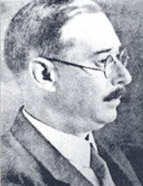

1. It is impossible to summarise – or even list – the extensive, multi-faceted work of JC, historian of culture, in terms of how he consolidated and broadened the study of the history of philosophical, scientific, literary, religious , and political ideas.
In the first half-century of the Schools of Arts and Humanities in the country, created by the Republic (1911), he was a central figure in teaching and historiographical research into Philosophy in connection with the sources of the history of ideas, which can only be compared to Vieira de Almeida, Edmundo Curvelo, Sílvio Lima or Delfim Santos, who did not follow a similar methodical path. Better still, he ‘rose to prominence in the field of university production’ in the 20 th century by setting out to find ‘the historical language we speak’ and showing ‘traces of Portuguese cultural history that are still hidden’ ( Biblos , 1980, pp.7-8).
Although ideologically and politically at odds but united (with Paulo Merêa) in his refutation of Coimbra ’ s positivist university culture, Cabral de Moncada, a friend and admirer, saw in him ‘the greatest historian of Portuguese culture in its historical-philosophical and philosophical-literary expression of this century’ ( Para a História da Filosofia em Portugal no século XX [For the History of Philosophy in Portugal in the 20 th century] , 1960, p.9). An analyst who was attentive to the Iberian production found in JC ’ s polygraphic enquiry into Portuguese culture only a parallel, in the Castilian context, in Menéndez y Pelayo of the 19 th century ( Miscelânea [ Miscellaneous ] , 1960, p. 346). Although Pelayo ’ s purity is not part of JC ’ s generous cosmopolitan and liberal genealogy, the analogy confirms the tireless researcher.
A figure of the university scholars repulsed by the autocracy of the Estado Novo [New State] , he did not bend to Salazar ’ s dictates, no matter how much the latter gradually snatched from him: the direction of the General Library (which he added to the secretariat of O Instituto [The Institute] in Coimbra) and the editing of the Revista da Universidade [University Magazine] ; the administration and direction of the University Press, extinguished on 29- 08 -1934, where he created remarkable collections, both of critical editions of sources – especially in the bodies Scriptores rerum lusitanorum , including the Crónicas [Chronicles] ; Biblioteca dos escritores portugueses [L ibrary of Portuguese writers] , Subsídios para a história da arte portuguesa [Subsidies for the History of Portuguese Art] , Documentos para a história da expansão ultramarina dos Portugueses [Documents for the History of Portuguese overseas Expansion] , Biblioteca do século XVIII [18 th century Library] , Biblioteca luso-brasileira de história da Medicina [Portuguese-Brazilian Library of the History of Medicine] , and Arquivo de História e Bibliografia [History and Bibliography Archive] (1923-1936), published posthumously in 1976 – or, in a broader sense, specialising in the dissemination of the classics of political philosophy and, in general, ethical-philosophical literature ( Biblioteca Democrática , Filósofos e Moralistas [Democratic Library, Philosophers and Moralists] , and Vária [Collectanea] ), publishing Kant, Montaigne, Descartes, Leibniz, Renouvier, Meumann, Croce , and others. But, at the same time, it opened pages to essays by new Portuguese authors (Cruz Malpique, Agostinho da Silva, Saavedra Machado, Newton de Macedo, Adolfo Casais Monteiro , and João Ameal, here contested by sectors of the reviralho [upheaval] ).
This work is financed by national funds through FCT - Foundation for Science and Technology, I.P, in the scope of the projects UIDB/04311/2020 and UIDP/04311/2020.
